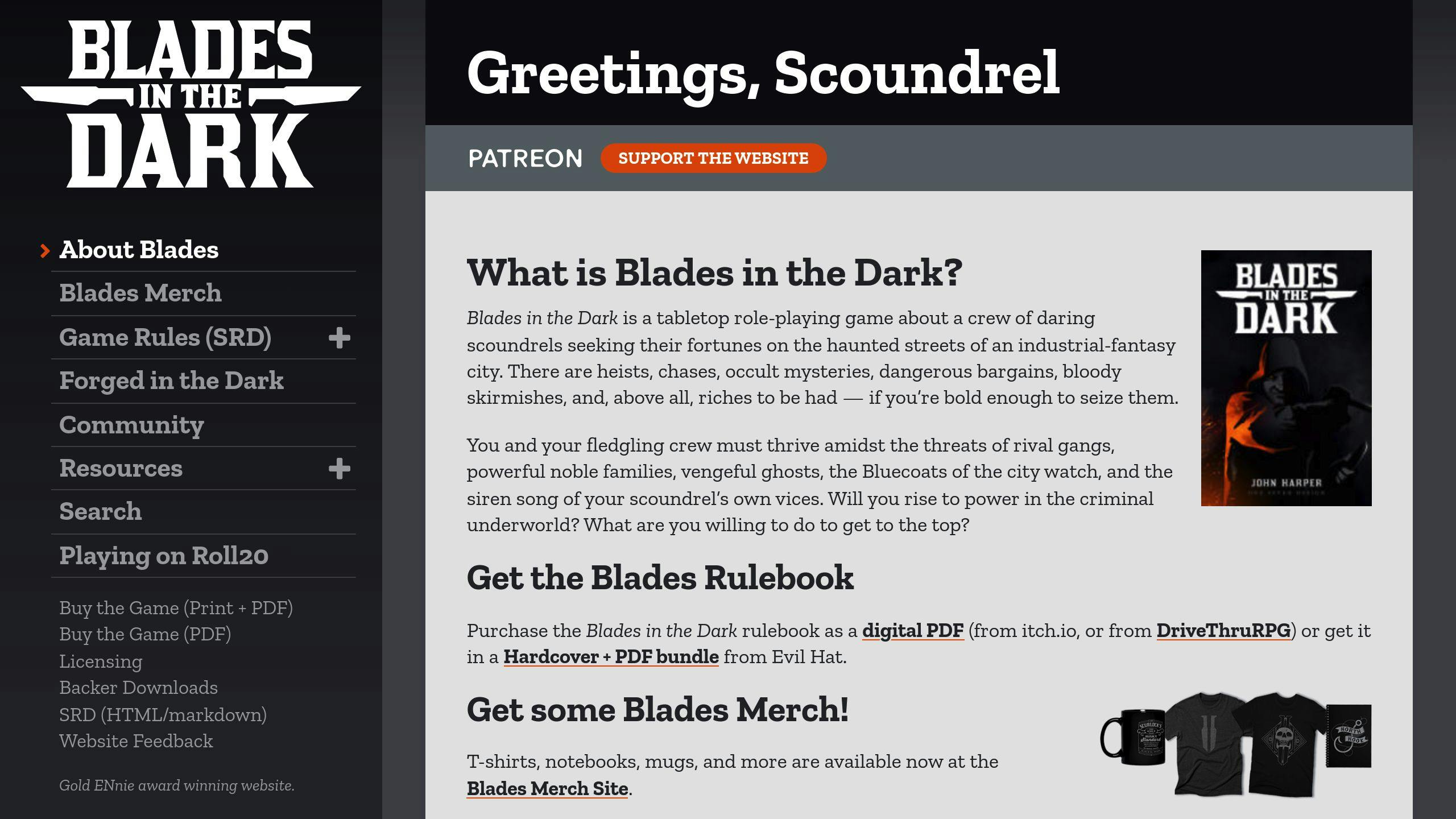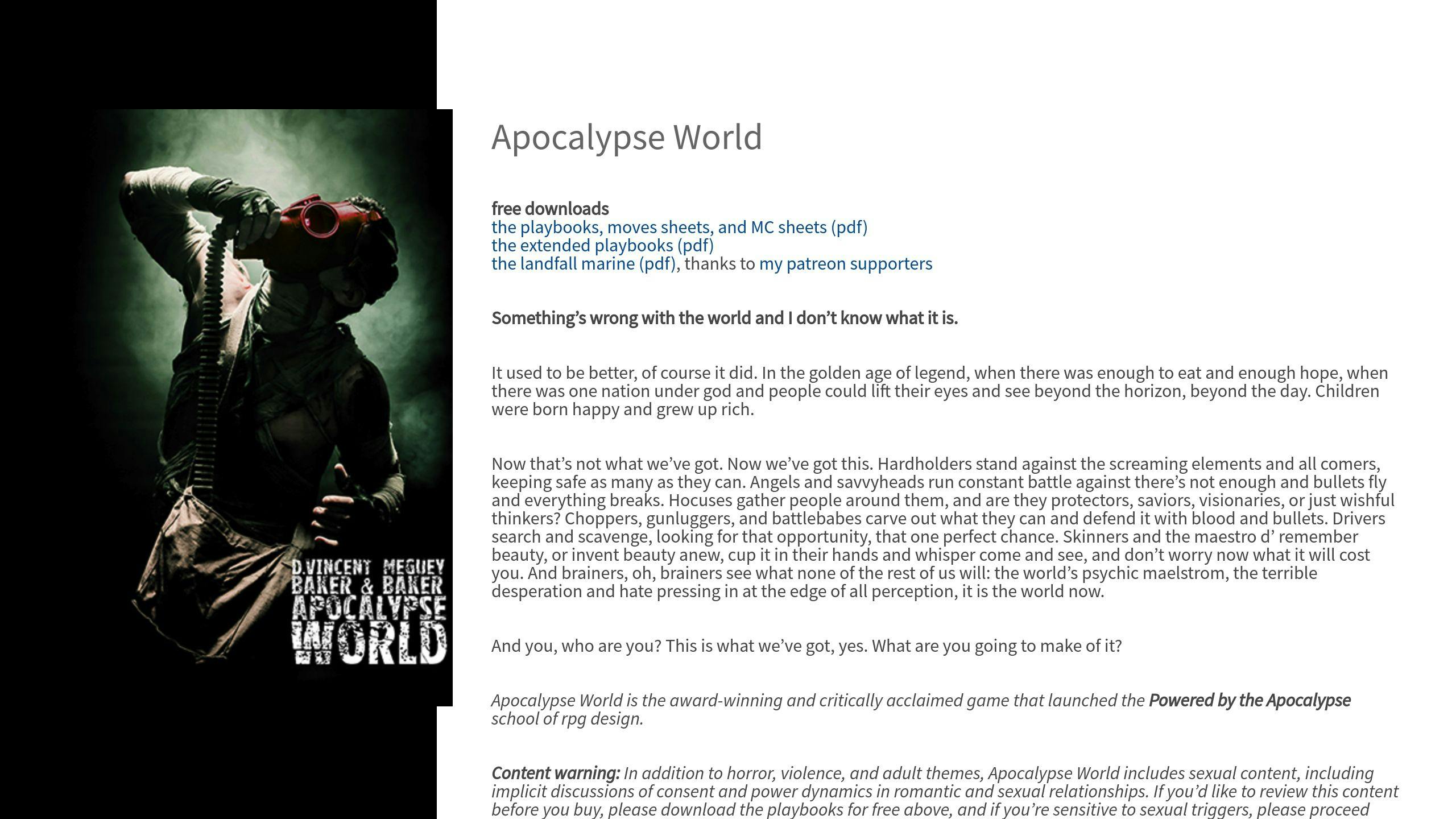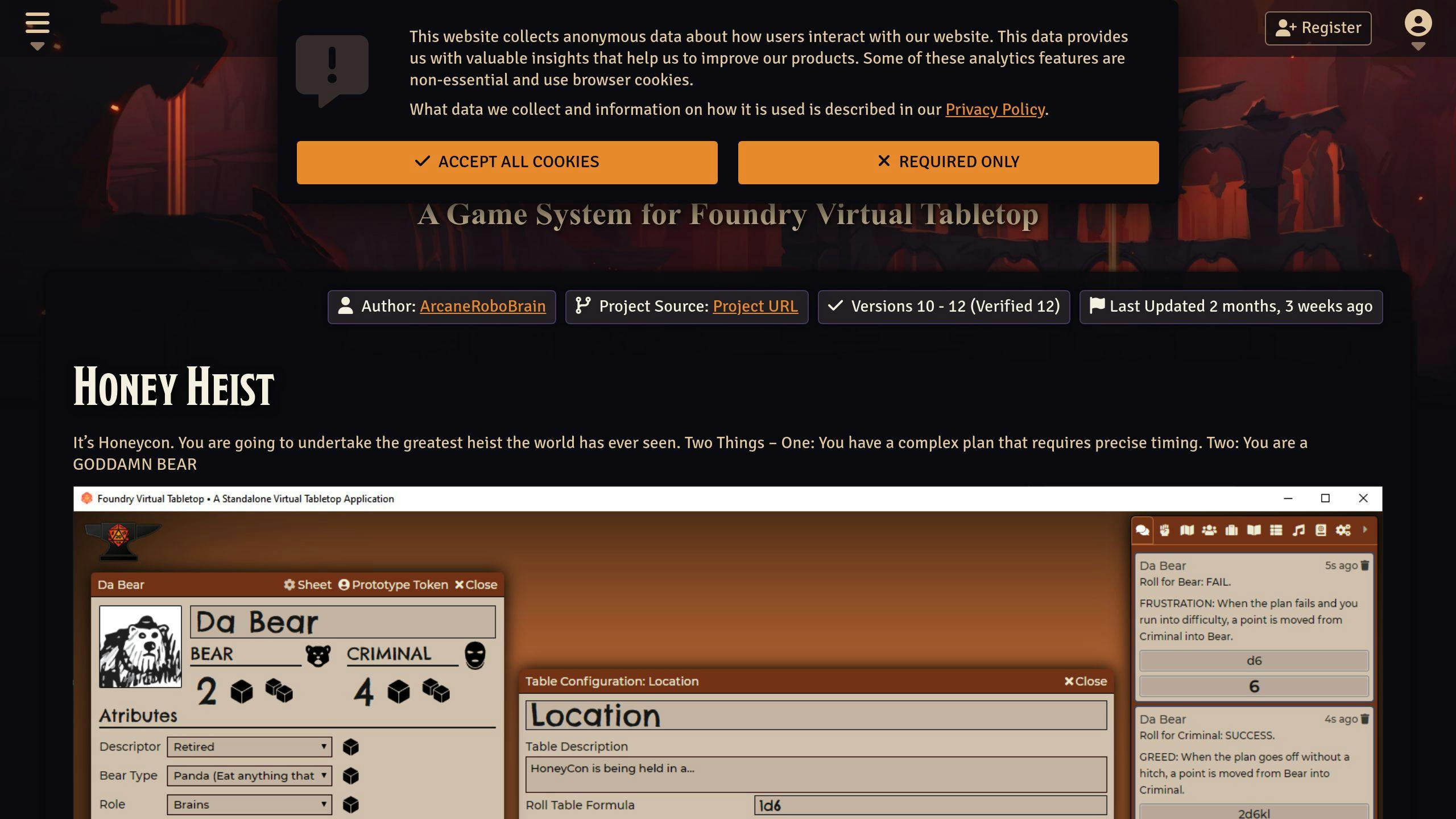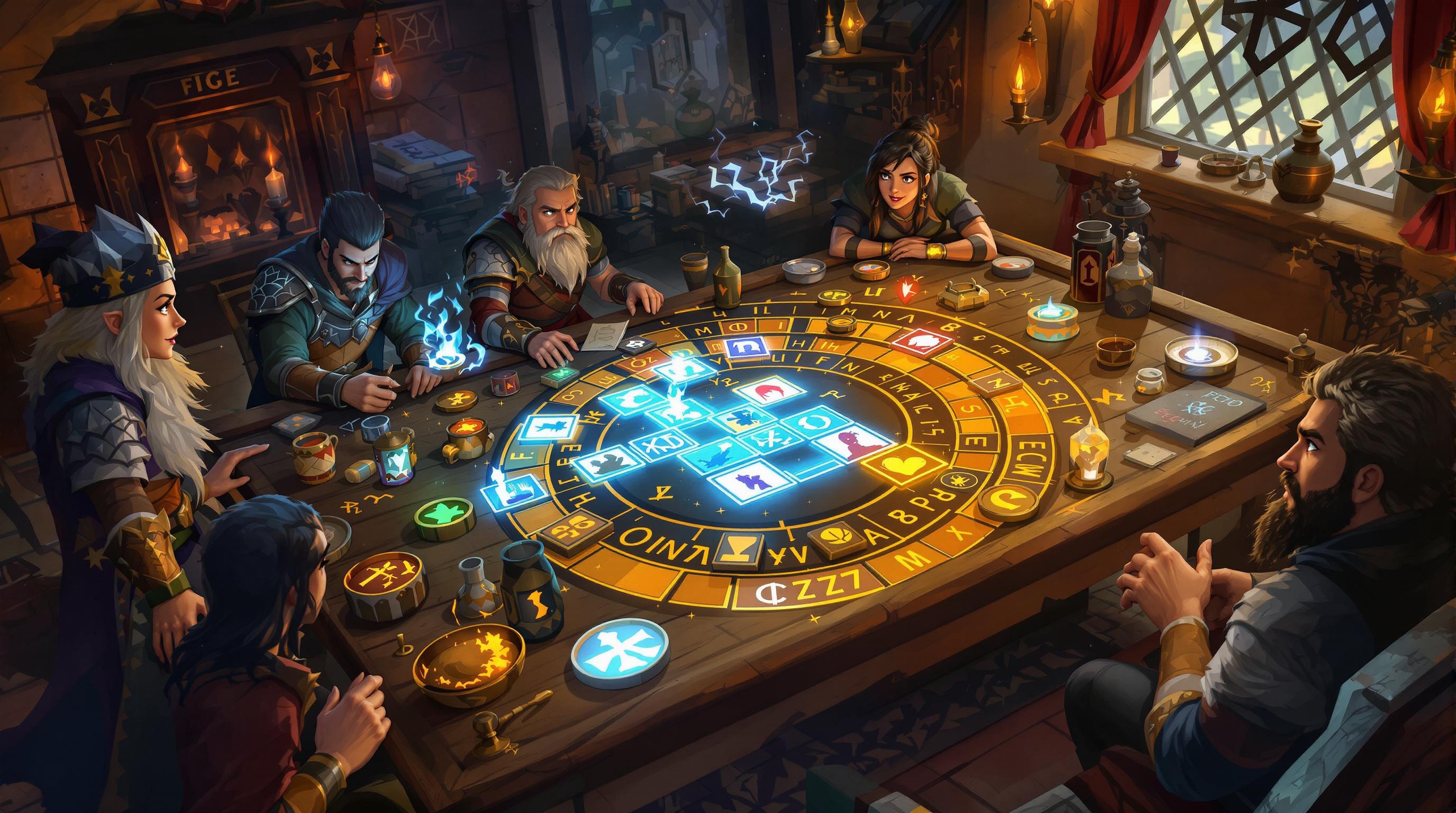Short on time but want to run a great tabletop RPG session? Here are 5 low-prep games perfect for busy GMs:
- Blades in the Dark - Heist-focused game with built-in tools to reduce prep
- Lady Blackbird - Steampunk adventure with pre-made characters and simple rules
- Apocalypse World - Post-apocalyptic game that encourages player-driven storytelling
- Fiasco - GM-less game of small-time capers gone wrong
- Honey Heist - One-page RPG where you play as criminal bears
These games let you run engaging sessions with minimal preparation through:
- Simple rule systems
- Ready-made characters and settings
- Collaborative world-building
- Mechanics that drive the story forward
Related video from YouTube
Quick Comparison
| Game | Setup Time | Player Count | Game Length | Rules Complexity |
|---|---|---|---|---|
| Blades in the Dark | 30-60 min | 3-5 | 3-4 hrs | Moderate |
| Lady Blackbird | 15-30 min | 3-5 | 2-3 hrs | Low |
| Apocalypse World | 30-45 min | 3-5 | 3-4 hrs | Moderate |
| Fiasco | 15-20 min | 3-5 | 2-3 hrs | Low |
| Honey Heist | 5-10 min | 3-6 | 1-2 hrs | Very Low |
Choose the game that fits your group's style and available prep time. With these low-prep options, you can focus on storytelling and fun rather than extensive planning.
Blades in the Dark

Imagine this: You're a GM with a packed schedule, craving to run a game but time's not on your side. Enter Blades in the Dark - your new go-to for quick, low-prep gaming.
Doskvol, a haunted industrial city, sets the stage. Players dive into a world of daring heists and criminal shenanigans. The best part? It's built for fast play with minimal hassle.
John Harper, the mastermind behind Blades, had busy GMs in mind. The game comes loaded with tools to slash prep time:
- Crew sheets track gang resources and contacts
- Action rolls keep the story moving
- Flashbacks let players justify actions on the fly
An RPGnet Forums GM shares:
"Be a fan of the players and their scoundrels. Get in the habit of narrating all failures as something beyond their control intervening."
This keeps the game flowing and takes the pressure off you to have every detail planned.
For one-shots, Rhi from The Magpies Podcast advises:
"As a GM, your job is to chase after the players and throw obstacles in their path as they careen headlong towards the inescapable consequences of their actions."
Quick setup? Just prep a target, a few key spots, and some NPCs. The game mechanics handle the rest.
But Blades isn't just about making your life easier. It's a full-on scoundrel simulator that keeps players hooked. The faction system adds depth without extra work from you. As players build their crew and clash with rivals, the story unfolds on its own.
2. Lady Blackbird

Want a game you can play right away? Check out Lady Blackbird. This steampunk adventure by John Harper is perfect for GMs who don't have time to prep.
Lady Blackbird comes in a 15-page PDF with everything you need:
- Steampunk setting
- Five pre-made characters
- Simple rules
- Ready-to-go starting scenario
The game starts with a bang. Here's how John Harper sets it up:
"Lady Blackbird is on the run from an arranged marriage to Count Carlowe. She hired a smuggler skyship, The Owl, to take her from her palace on the Imperial world of Ilysium to the far reaches of the Remnants, so she could be with her once secret lover, the pirate king Uriah Flint."
From there, players shape the story. The open-ended setup lets everyone get creative.
Why is Lady Blackbird great for busy GMs?
- You can learn the rules in under 30 minutes
- It works for one-shots or short campaigns
- Characters come with built-in story hooks
- GMs can improvise instead of planning everything
A GM on RPGGeek said:
"I really love Lady Blackbird and, based on the number of awards it's won, so do a lot of other people. It delivers a fully-realized, story-driven session with absolutely zero prep time."
For online play, it's easy to set up. One GM spent less than an hour creating Roll20 character sheets and a ship background. The result? "We had a blast!"
Lady Blackbird gives you structure and freedom. As an RPGnet reviewer put it:
"Lady Blackbird is something of a novelty... The scenario is the focus, and the rules are just there to provide a means of running it."
This lets GMs focus on the story, not complex rules or world-building.
If you're short on time and want a game that's easy to run and full of storytelling potential, Lady Blackbird might be your answer. Plus, it's free to download, so you can try it without spending a dime.
sbb-itb-b8b00a5
3. Apocalypse World

Apocalypse World is a game-changer for GMs short on prep time. Created by D. Vincent Baker and Meguey Baker in 2010, this post-apocalyptic system flips the script on traditional roleplaying games.
What makes it special? It's all about player-driven storytelling. The game's setup encourages players to help shape the world, taking some weight off the GM's shoulders. As Vincent Baker puts it:
"MCing is a way to GM that I didn't invent, I'm just explaining it and providing some good tools for it."
These tools? A set of principles and "moves" that guide the GM (or MC - Master of Ceremonies) in running the game. Take the first principle, "Barf Forth Apocalyptica." It's all about painting a vivid, gritty picture of the post-apocalyptic world on the fly.
Why's it great for busy GMs?
1. Players help build the world
Less prep time for you. More engagement for them.
2. Clear GM guidelines
The MC chapter is your roadmap to running the game.
3. Open-ended story
"Play to find out what happens" keeps things flexible and fresh.
Want to run Apocalypse World like a pro? Here's the scoop:
- Create memorable NPCs and ask questions that get players talking.
- Use threat cards to keep track of what's causing trouble.
- Lean on those 15 MC moves when you need to think on your feet.
Apocalypse World's impact goes beyond its own setting. It's sparked a whole family of "Powered by the Apocalypse" (PbtA) games, each putting its own spin on the core mechanics.
But heads up: this game can stir up some in-party drama. The moves are designed to work on other player characters too. As Tim Franzke, a seasoned GM, puts it:
"Apocalypse World looooooves them conflicts."
It can add depth to your sessions, but make sure everyone's cool with potential character clashes.
New to Apocalypse World? Start with the MC chapter. Even if you don't end up running the game, the tips and tricks in there can level up your GMing across the board. Remember, in Apocalypse World, it's all about rolling with the punches and letting the players drive the story.
4. Fiasco

Want a wild ride with zero prep? Fiasco might be your game. This award-winner throws 3-5 players into a whirlwind of bad choices and worse luck - no GM needed.
Think Fargo or Burn After Reading. Fiasco lets you craft tales of small-time capers gone hilariously wrong. The best part? You can dive in with almost no setup.
Here's how it works:
1. Set the stage (15-20 minutes)
Pick a playset, roll some dice, and establish your characters and their messy connections.
2. Play out two acts (about an hour each)
Watch your plans crumble as you make increasingly terrible decisions.
3. See how it all shakes out (15 minutes)
Wrap up your story and see who (if anyone) comes out on top.
All in, you're looking at 2-3 hours of pure chaos.
Why is Fiasco perfect for busy GMs? No prep, built-in story engine, and it works with 3-5 players. Ideal for those nights when not everyone shows up.
The game's secret weapon? Playsets. These themed packages give you 144 elements covering relationships, needs, locations, and objects. Roll, pick, and watch the madness unfold.
WIRED nails it:
"Fiasco is an award-winning roleplaying game (RPG) about plans gone awry, bad decisions made worse, and stupid people doing even stupider things."
Don't let the simplicity fool you. Fiasco can deliver laughs or drama, depending on how you play it.
When teaching newbies, start with the aftermath. Show them that even terrible choices can lead to unexpected wins. It helps them embrace the chaos.
Fiasco thrives on player interaction. Push each other into bad decisions, say "yes, and..." to crazy ideas, and don't be afraid to make a mess. That's where the fun happens.
In one session, you might see a small-town gambler tangle with a corrupt detective over a high-stakes poker game gone wrong. The possibilities? Endless.
Short on time but big on imagination? Give Fiasco a shot. It's your ticket to an unforgettable game night, no prep required.
5. Honey Heist

Want a game that's sweet and simple? Try Honey Heist, the one-page RPG where you're bears pulling off a heist.
Grant Howitt created this gem in 2017. It's perfect for GMs who want big fun with zero prep. Here's the deal:
You're bears. You're criminals. Your goal? Steal honey from HoneyCon. That's it.
Making a character takes seconds. Roll a d6 for your:
- Bear type
- Descriptor
- Criminal role
The game uses two stats: Bear and Criminal. Both start at 3. Roll under your stat to succeed. It's a balancing act between your bear nature and criminal skills.
Honey Heist's charm is in its simplicity and humor. RPG historian Stu Horvath says:
"If there is a perfect archetype for Howitt's one-page RPGs, my money is on Honey Heist, a heist game in which players are bears ... It's absurd beyond any reasonable use of the word - and wonderful. Get that honey!"
Why do busy GMs love it?
1. No prep needed
The whole game fits on one page. Download and play.
2. Quick to learn
Explain the rules in minutes.
3. Sparks creativity
The simple structure lets imaginations run wild.
4. Flexible scenarios
From scouting to hacking, every heist is different.
Honey Heist thrives on improv. You might have a Shakespeare-quoting bear distracting guards while another hacks security. It's all about embracing the crazy.
Want to spice things up? Try these:
- Roll for random settings and security
- Encourage bear puns
- Use the "Queen of all Bees" as a target
The goal isn't just stealing honey - it's creating fun moments. Grant Howitt, the game's creator, says:
"This one-shot is meant to be a goofy, uproarious time with lots of 'Yes, and' moments."
So when you're short on time but want maximum fun, give Honey Heist a go. It's simple, hilarious, and will have your group buzzing for more.
Quick Comparison of Each Game
Let's see how these five low-prep TTRPGs stack up. This breakdown will help busy GMs pick the right game for their group and time constraints.
| Game | Setup Time | Player Count | Game Length | Rules Complexity |
|---|---|---|---|---|
| Blades in the Dark | 30-60 minutes | 3-5 | 3-4 hours | Moderate |
| Lady Blackbird | 15-30 minutes | 3-5 | 2-3 hours | Low |
| Apocalypse World | 30-45 minutes | 3-5 | 3-4 hours | Moderate |
| Fiasco | 15-20 minutes | 3-5 | 2-3 hours | Low |
| Honey Heist | 5-10 minutes | 3-6 | 1-2 hours | Very Low |
Blades in the Dark has a structured gameplay loop: freeplay -> heist -> downtime/freeplay -> heist. It's got faction rules and a stress management system that add some meat to the game. But heads up: new players might find the core dice mechanic a bit tricky.
"Blades in the Dark has a lot to recommend it. The faction rules in particular are amazing and worth reading even if you never plan to run the game." - Mythcreants
Lady Blackbird is all about simplicity and quick setup. Pre-made characters? Check. Flexible setting? You bet. It's perfect if you're a GM who likes to wing it. The game's creator, John Harper, sets the scene:
"Lady Blackbird is on the run from an arranged marriage to Count Carlowe."
From there, you can take the story anywhere. Great for one-shots or short campaigns.
Apocalypse World kicked off the whole Powered by the Apocalypse (PbtA) thing. It's light on GM prep but heavy on thinking on your feet. Vincent Baker, who co-created the game, says:
"PbtA isn't a system."
It's more of a philosophy. If you're a GM who thrives on improvisation, this one's for you.
Fiasco is the odd one out - no GM needed. It's all about "small-time capers gone disastrously wrong" in just a couple of hours. You get 144 elements covering relationships, needs, locations, and objects. Mix and match, and you've got a story.
Honey Heist is the speed demon of the bunch. Grant Howitt whipped up this one-page RPG, and you can be playing in minutes. It's got two stats (CRIMINAL and BEAR) and a premise that'll make you chuckle. Howitt's take:
"If you have a funny crew, or want to get your family to play an RPG without the overhead of traditional RPGs, that can be as lighthearted as you want, I would choose this one."
So, what's a busy GM to do? If you want depth, go for Blades in the Dark or Apocalypse World. Lady Blackbird hits the sweet spot between depth and simplicity. And if you're after quick, light fun, Fiasco and Honey Heist are your go-to games.
Final Tips
Running low-prep TTRPGs can be a game-changer for busy GMs. Here's how to make the most of these games:
Pick a system that fits your group and style. One RPG fan put it this way:
"You're on the edge of a potential shift in your play style that, for me, was a point of no return. Once I really internalized how much I hated session prep, and why, there was no going back."
Sharpen your improv skills. Maybe take an improv class to boost your on-the-spot storytelling. It'll make a big difference in low-prep sessions.
Talk to your players. Let them know what to expect. One GM said:
"Inform your players that the game will involve improvisation, as mismatched expectations can lead to negative experiences."
Keep it simple with tools. A basic wiki like Zim can help organize your game stuff without needing tech skills. A user shared:
"The great thing about it is that I can easily create new tags as they become useful without worrying about the whole wiki organization."
For newbies, start small. Use low-level one-shots with easy rules. Mike from SlyFlourish.com suggests using core classes from the Players Handbook for new characters to keep things clear.
Read, then read again. For one-shots, know that scenario inside out. Gnome Stew says:
"You can't read a one-shot too often - every read-through will improve your familiarity with the scenario, and reduce the number of times you need to look things up or otherwise break momentum."
Stick to one setting. Rick Heinz, author and storyteller, advises focusing on a single location. It lets you dig deeper into the story and roleplay, instead of bouncing around different places.


